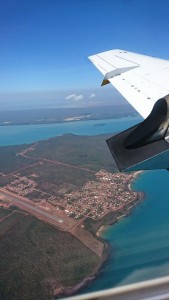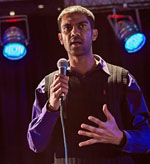5 Life Lessons From A Remote Aboriginal Community.

Photo taken by the author, as he flew out of this remote Aboriginal community.
In June this year, an opportunity presented itself for me to do volunteer work in a remote Aboriginal community. It was located in northern Australia (East Arnhem Land).
Most of us who live in big cities can only imagine what life is like in remote Aboriginal communities. Living there is an experience that cannot be fully defined in just words. One has to be there to fully immerse themself into the rich cultural and traditional understanding of such communities.
As someone who was previously looking from the outside in, my perspective, perception, and projection transitioned into one of empathy, admiration, and understanding once I arrived in that community.
The residents of this remote community are void of the many material possessions that most of us in capital cities have. Yet, their outlook on life is not even comparable to what we have.
Here are five life lessons learnt from living in a remote Aboriginal community:
- Collective resilience is strengthened through adversity – This particular community was hard hit by a cyclone about two years ago. A high percentage of the population lost many of their material belongings and their houses. Soon after the cyclone, multiple families had to live under one roof in houses that were suitable for just one family. Instead of feeling bottled in, the residents of this community felt more of a sense of belonging when families had to live together in such conditions. They banded together to help each other in re-building their lives. Speaking to one of the elders about the cyclone, he said “No disaster is strong enough to destroy our strength as one mob!”
- Meaning is how you define it – In western society, generally speaking, life’s meaning is to be “successful”. That word is very loosely used and defined. Success has different meanings to different beings. The residents in this remote Aboriginal community have a different approach to life, and give a unique meaning to what life means to them. They are more focussed on living through their culture, and upholding the customs that have been existent for more than 40,000 years. Respect plays a vital role in their lives. Relationships define how you would refer to a person eg. you will only refer to a person as a “brother, aunty, grandmother, nephew” etc. Referring to a person by their name is not part of their living. What became very apparent from the onset was that their approach is to be free in life. Free in the sense that they embrace/express freedom through the land, the sea, and the culture (dance, music, stories). They do things that create an expression of their true selves. Their meaning toward life is something that we, in capital cities may/will find a foreign concept.
- Family is more than everything – As the African proverb states, “It takes an entire village to raise a child”. Family is more than everything in this community. I did my very best to understand how empathic the focus on families is. It was still beyond my comprehension how family took precedence over everything and anything. If someone is in need, the immediate/extended family will provide any support needed. In capital cities, it is said that “Houses are getting bigger, and homes are getting smaller”. In this remote Aboriginal community, the home will always remain big. Children are taught from an early age that family is worth more than any material possession that they will come across. They pass that value to the next generation, and the cycle continues in sustaining solid family values.
- Less is more – Most people in this community have bare essentials that they are very content with. Men will wear shorts, t-shirts, and light footwear (flip flop slippers). You will barely see anyone with expensive watches, designer brand apparel, and the latest gadgets to keep up with technology. Children will run on the beach, play football without any boots, and spend most of the time outdoors (in the dry season). There are very few cars in the community, and the locals walk from point A to point B. Having less than the average westerner does not seem to make their life inferior in any sense of the word. They are more than content with their lifestyle.
- No one is a stranger – On my third day in this community, two elders called me for a chat under a gum tree. One of them pointed to the ground, and asked me to sit down. He explained that both of them had felt a strong connection with my spirit, and wanted to adopt me into their tribe. As part of that process, I was given a Spirit Totem, a Clan Name, a Skin Name, and was told that I now officially belong to that tribe (mob). It was way beyond my comprehension as to how an outsider could be accepted into this community after just three days! One of the elders explained “No one is a stranger here. You come here, you become part of us!” Can you imagine if we had that outlook/approach in every community or on every street on earth?
Leaving this remote Aboriginal community was challenging indeed. Not only did my outlook change, my understanding of how life can be defined in different ways took a turn for the better.
Here’s to sincerely hoping that some of these lessons can/will support you in reviewing what is important to you…
Influencing you to your excellence,
Ron
PS: Here is my Anti-Bullying Charities latest short video (The Difference Between Bullying and Teasing)- https://youtu.be/jhVjg3KxfxQ










